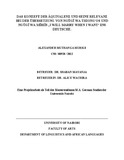| dc.description.abstract | African literature has in the course of time curved its niche in several European countries
including Germany. Translation has played a key role in this process, and thus the need to
increase awareness on the necessity of translating African literature into other languages. As a
contribution to this, the following study seeks to investigate the translational problems that arise
in the process of translating Ngũgĩ wa Thiong’o’s and Ngũgĩ wa Mĩriĩ’s play entitled “I will
marry when I want” into German. In order to achieve this, a portion of the play was translated
into German based on the concept of equivalence as propagated by Nida (1964) and Koller
(2011). Eugene Nida differentiates between two major types of equivalence namely formal and
dynamic equivalence. Werner Koller on the other hand highlights the necessity of definition of
context when handling the issue of translational equivalence, and differentiates between several
types of equivalence including denotative, pragmatic and formal-aesthetic equivalence among
others. The translation was then followed by an analysis where the challenges encountered are
mentioned and possible solutions suggested, with focus on the translation of proverbs. This play
was first written in Gikuyu language under the title “Ngaahika Ndeenda” and was later translated
into English by the authors and the study also critically analyses the authors’ own translation of
the play. Subsequently, the proverbs analyzed in this study are those that have their roots in the
Gikuyu language, were then translated into English by the authors, and were further rendered
into German for purposes of this study. The original proverbs contained in the Gikuyu version of
the play are therefore reflected on in the process of analysis. Two main challenges were
identified by the study pertaining to the translation of proverbs as follows: (1) ‘Gaps’ of
understanding as Waltraud Kolb (2011) calls them. (2) Translation of culture specific elements.
Several solutions were suggested for these problems including the use of equivalent proverbs in
the target language, literal translation of proverbs aided by footnotes to eliminate
misunderstandings among others. A general conclusion was also drawn that neither strict formal
equivalence nor complete dynamic equivalence would be best suited for the translation of
African literature into German, but rather a blending of the two, whereby the translator considers
both orientations in the process of translation and applies them accordingly corresponding to his /
her goals. | en_US |

